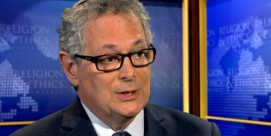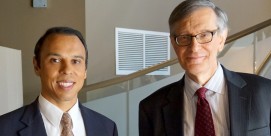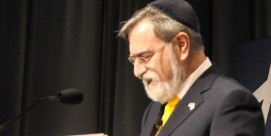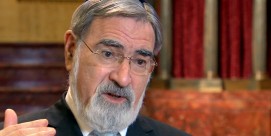Randall Balmer: Mitt Romney’s Defining Moment
In what may be seen as the defining moment of his campaign, Mitt Romney, the former governor of Massachusetts and a Mormon, sought to address the issue of his faith and its bearing on his pursuit of the presidency. Pundits and historians inevitably compared Romney’s speech in College Station, Texas, with the speech that John F. Kennedy gave at the Rice Hotel just down the road in Houston on September 12, 1960.
The parallels are unmistakable. Both men felt compelled to address what was openly discussed as the “religious issue” during the 1960 presidential campaign. Both men were reared from infancy in a tradition different from Protestantism, which in its various forms claims the allegiance of at least a plurality (if not a majority) of Americans.
But the parallels end there. Unlike Mormonism, Roman Catholicism was well known to most Americans in 1960, although many Protestants had a jaundiced view of the Roman Catholic Church. Many Americans today, by contrast, know little about Mormonism, officially named the Church of Jesus Christ of Latter-day Saints. Much like the anti-Masonic movements in the nineteenth century, Americans see Mormons as secretive; their temples, for instance, are closed to “gentiles” (non-Mormons).
For evangelicals in particular, some of the tenets of Mormonism are troubling. The Mormon notion of God as both male and female, baptism for the dead, and even the practice of wearing Mormon underwear (thought by many to have protective powers) strike many evangelicals as unorthodox, if not downright bizarre.
Most crucial, however, is the doctrine of revelation. Mormons accept the Hebrew Bible (Old Testament) and the New Testament as divinely inspired, but they believe that the Book of Mormon, discovered by Joseph Smith in Palmyra, New York, in 1827, is similarly inspired. And Mormons believe that the president of the Latter-day Saints is the conduit for continuing inspiration.
Evangelicals, on the other hand, have an almost talismanic view the Bible (Old and New Testaments), which they often refer to as “the word of God” and which provides their sole religious authority. For another religious group to “tamper” with the canon of scripture — much less add to it at any time — strikes most evangelicals as utter blasphemy.
All of these suspicions do not augur well for Romney. Politically conservative evangelical voters have become the core constituency for the Republican Party, much the way that labor unions once provided the backbone of the Democratic Party. In order to win the Republican nomination, Romney needs the support of politically conservative evangelicals, who are especially active in Iowa.
Throughout the early months of the campaign, Romney sought to downplay his faith, protesting that he is not a spokesman for Mormonism. But many voters, evangelicals especially, have not been mollified — which led him to the dais of the George Bush Library in Texas Thursday morning (December 6) to deliver his “JFK speech.”
Two of the most compelling arguments central to Kennedy’s speech in 1960, however, are not available to Romney. Kennedy unequivocally affirmed his “absolute” support for the separation of church and state, and he also foreswore government support for religious schools. Romney cannot echo those positions, and indeed he hedged on the former and refused to address the latter. The leaders of the religious right preach that the separation of church and state, as encoded into the First Amendment, is a “myth.” They also seek taxpayer support for church-related schools.
So, in the end, Romney was reduced to bromides about religious liberty and “family values.” (Mormons are good at “family values.”)
Ironically, Romney missed the opportunity to make his best case for a Mormon to be president. Mormons believe that America’s charter documents, the Declaration of Independence and the Constitution, are actually divinely inspired. After seven years of an administration that views the Constitution as a nuisance, many Americans, I suspect, would welcome a president who sought to defend the integrity of the Constitution rather than subvert it.
Randall Balmer, an Episcopal priest, is professor of American religious history at Barnard College, Columbia University, and a visiting professor at Yale Divinity School. His most recent book, GOD IN THE WHITE HOUSE: A HISTORY: HOW FAITH SHAPED THE PRESIDENCY FROM JOHN F. KENNEDY TO GEORGE W. BUSH, will be released by HarperOne in January.







